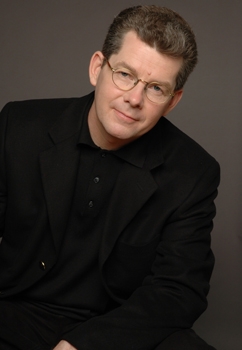Frost Opera Theater brings riveting life to “Death of Webern”

Alan Johnson conducted Michael Dellaira’s “The Death of Webern” Thursday night at Frost Opera Theater.
The University of Miami’s adventurous Frost Opera Theater presented a concert version of The Death of Webern, a one-act opera by American composer Michael Dellaira and librettist J. D. McClatchy Thursday night at the intimate Clarke Recital Hall. Combining the music department’s faculty, students and alumni, the performance was nothing short of riveting from the first bars to the quiet resignation of the ending.
Dellaira’s compact work is cast in 13 scenes. Based on the writings of Hans Moldenhauer, the work recounts the musicologist’s investigation into the mysterious circumstances surrounding the death of Austrian composer Anton Webern. On September 15, 1945, five months after the end of World War II, Webern was shot by an American GI in the countryside village of Mittersill near Salzburg.Moldenhauer’s correspondence with the US State Department about the incident leads to stonewalling.
Eventually Moldenhauer’s interviews the widow of the soldier who killed Webern and the composer’s surviving sister. He concludes that there was a case of mistaken identity. Webern’s son-in-law Benno was suspected of selling contraband on the black market and soldiers had come to his home to arrest him. The composer stepped out on the porch of the surrounded house and lit a cigar. Tragedy and an American coverup of the incident ensued.
To dramatize this tale in a mere 75 minutes is no small accomplishment but Dellaira and McClatchey have conceived a gripping whodunit filled with brief but vivid characterizations. Dellaira’s arioso style moves from nervous, skittering lines for American officials and soldiers to expansive melodic paragraphs for the composer’s sister and the beleaguered soldier’s widow.
In two brief appearances, Webern himself emerges as a commanding figure, his music taking lyrical flight as he desperately writes his publisher for advance remuneration due to the difficult postwar economic climate. At a private party, he lectures on the history of music, linking his vision of new harmony through 12-tone techniques to the organ music of Bach in a compelling narrative.
Dellaira masterfully incorporates excerpts from Webern’s works (Im Sommerwind, Passacaglia, Satz für klavier) into the thematic textures. He manages to distill much of Webern’s concise, transparent style through delicate writing for a six-piece instrumental ensemble. Dellaira’s sound world constantly changes and surprises, paralleling the story’s twists and turns.
It would be difficult to imagine a performance of greater musical dedication and refinement than that presented by the Frost faculty forces. Kevin Short dominated the proceedings as Moldenhauer, an émigré who fled Nazi terror and became a distinguished pedagogue in Washington state. Short’s clear diction melded to a deep, strong bass projected the opera’s conscience. He was particularly effective in the final scene as Moldenhauer reflects on the senseless, violent death of an innocent creative artist and those unwilling to acknowledge the facts.
Tony Boutté turned Webern’s two brief appearances into highlights of the evening. Against whirling melodic cells from the ensemble, Boutté’s subtle wordplay mirrored Webern’s lecture on the logic of music and harmony. His fine tenor was both powerful and dulcetly colored. Like Short, he was a paragon of verbal clarity.
Maria Fenty Denison coped capably with the high mezzo line of Helen Bell, widow of Raymond Bell, the army cook who fired the fatal shot. Denison powerfully narrated her husband’s sense of guilt and, accompanied by eerie percussion, the irony of his death from alcoholism ten years to the day after the tragic incident that haunted him. As Webern’s daughter, Esther Jane Hardenbergh soared in a deeply emotional aria recounting the events and aftermath, her soprano richly colored and easily encompassing the scena’s wide vocal range.
In brief appearances, Jeffrey Williams’ superb baritone and verbal command strongly registered as the translator who identifies Bell and Mario Almonte’s bright tenor turned an American Legion correspondence clerk into a memorable cameo. Eric McConnell’s sturdy baritone encompassed the dual roles of a bitter soldier and sentimental student of Moldenhauer. In dramatic, dark tones Carl DuPont narrated a soldier’s version of the tragic events. Zaray Rodriguez, Mia Rojas, Ana Collado, Adam Cahill and actor Chris O’Connor (in a brief scene as Bell) were all excellent in important vignette scenes.
Alan Johnson, director of Frost Opera Theater, conducted a top-notch ensemble in Dellaira’s elegantly sculpted score. Scott Flavin’s amplified violin, Ross Harbaugh’s agile cello and clarinetist Margaret Donaghue and flutist Trudy Kane’s were especially impressive. Anastasiya Naplekova’s sensitively arched keyboard solo near the conclusion brought the evening full circle.
Although this was a one-night event, the fine score and excellent performance will have an afterlife. The performance was recorded for future commercial release.
Posted in Performances
One Response to “Frost Opera Theater brings riveting life to “Death of Webern””
Leave a Comment
Fri Apr 24, 2015
at 1:18 pm
1 Comment







Posted Apr 24, 2015 at 2:14 pm by Thomas Sleeper
We are very fortunate to have Alan Johnson at the Frost School and in our community.